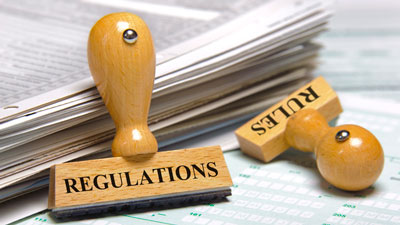All businesses in the United States must comply with state and federal regulations established by governing bodies. The United States Department of Labor, enforces more than 180 laws for some 125 million workers. Because this country is driven by business, certain regulations must be in place to limit the power of business and protect the country’s employees.
Government Regulations for Businesses Operating in the United States
Some of these regulations stand out and affect employees more than others.
Environmental regulations
 There are environmental standards for small businesses to reduce the negative impact of manufacturing on the environment. The initiatives approved by Congress are planned and led by the Environmental Protection Agency and implemented by state environmental agencies. For example, the Clean Air Act of 1990 describes EPA’s responsibilities to protect air quality. This law covers the cleaning of air pollutants, regulates vehicles and their contribution to air pollution, cleaning the air in national parks, reducing acid rain, conserving the ozone layer and calling for the action of the general public. The Marine Protection, Research and Sanctuaries Act of 1972 also prohibits the dumping of harmful materials of any kind into the ocean. Environmental cleanup regulations require companies that contribute to hazardous waste sites to provide cleanup personnel or pay EPA for cleanup.
There are environmental standards for small businesses to reduce the negative impact of manufacturing on the environment. The initiatives approved by Congress are planned and led by the Environmental Protection Agency and implemented by state environmental agencies. For example, the Clean Air Act of 1990 describes EPA’s responsibilities to protect air quality. This law covers the cleaning of air pollutants, regulates vehicles and their contribution to air pollution, cleaning the air in national parks, reducing acid rain, conserving the ozone layer and calling for the action of the general public. The Marine Protection, Research and Sanctuaries Act of 1972 also prohibits the dumping of harmful materials of any kind into the ocean. Environmental cleanup regulations require companies that contribute to hazardous waste sites to provide cleanup personnel or pay EPA for cleanup.
Advertising regulation
Advertising is essential to business, but the federal government has established advertising laws to help keep businesses honest in their marketing campaigns, avoiding false advertising and fabricated claims. Violation of truth laws can cost businesses considerable amounts of money in fines, as well as the risk of legal action taken by deceptive consumers. Truthfulness in advertising applies to marketing outlets such as commercials, newspaper ads, online advertisements, and billboards, and requires that all marketing materials be truthful, supported by evidence, and fair in nature. The Fair Packaging and Labeling Act requires that all products indicate the ingredients and nutrition, the identity of the product, and the location of the packaging and distribution. In addition, all the information on the labels must be accurate and follow the rules of truth in advertising. The Federal Trade Commission enforces online advertising regulations to help protect consumer privacy and prevent anonymous spam. Online advertising is illegal if it misleads consumers; An online ad is misleading if it harms consumers, its origins are untraceable, its disclaimer clauses are unclear, and / or if refunds are not available, according to the FTC website.
Privacy regulation
Businesses – small and large alike – often handle confidential information related to their customers and employees, including credit card numbers, social security numbers, and addresses. If this information is released, consumers face identity theft and credit card theft. The Federal Trade Commission enforces privacy laws passed by Congress to protect the financial information and identities of consumers and employees across the country. The identity theft regulation states that if your company is responsible for the identity theft of a customer because of the information you collected from them, the company must provide useful information to the customer to resolve the issue. The Gramm-Leach-Bliley Act offers protection to individuals who have confidential information held by financial institutions in the United States. These institutions must provide privacy literature to consumers and have a security plan in case information is leaked.
Employment regulations
Regardless of the types of employees you have, whether they are contractors, freelancers, or full-time workers, small business owners should be very familiar with employment laws in the United States. These issues affect millions of people, making it one of the most important areas of business regulations imposed by the DOL. Employment regulations cover fair wages and hours, retirement benefits, health insurance benefits, workplace discrimination, workers’ compensation, and unions. These regulations help keep employer-employee relationships relatively fair and protect individuals from harassment, discrimination, and unfair treatment. For example, the federal government sets a standard for the minimum wage, then state governments adjust that standard to suit the economy in different parts of the country.
Government’s role in promoting small businesses
Businesses create jobs and pay taxes, so it’s only natural that the government wants to help them get started and prosper. Municipalities, counties, states, and the federal government offer direct and indirect assistance to individual businesses and industries through a variety of monetary grants, paid research, legislation, and worker training. If you haven’t already, contact your local and state economic development offices to see how they can help you.
Economic development
Governments create specific programs to help businesses start, continue to grow, and relocate to specific areas. In some ways, state, county, and local governments compete with each other for jobs. They do this by offering start-up incentives and taking steps to create a ‘business-friendly’ environment. These steps include tax credits, worker training, free land, zoning changes, low-interest loans, infrastructure improvements, and help with quick licenses and permits.
Loans
Government agencies such as the United States Small Business Administration offer loan guarantees to small businesses, encouraging local banks to work with new businesses or businesses in the area that want to expand. Talk to your banker about state or federal loan programs that offer low interest rates or are targeted at women, minorities, or businesses in specific industries. Contact your state economic development office to find out if it has loan programs.
Investigation and development
The federal government awards scholarships to academic institutions that work to develop new technologies that benefit the industry, except that the institutions share the technologies with the industry. In some cases, the government will provide grants to private companies that develop a new product or service that improves a vital area of the economy, such as transportation, energy, agriculture, or communications. Some states also fund research and development projects, working with private investors and the federal government to raise funds.
Infrastructure improvement
Business works best when you can move raw materials to factories efficiently and get finished products to plants and markets quickly. Governments help improve the infrastructure needed for businesses to prosper, which would be too costly for any business to finance. This includes the construction and maintenance of roads, bridges, railways, airports, seaports, power transmission lines, and telecommunications systems.
Education and formation
To ensure that companies have access to skilled workers, governments offer free education to primary and secondary students, grants and loans for higher education, and job training programs. Governments often work with trade schools, community colleges, and universities to provide free training to workers.

